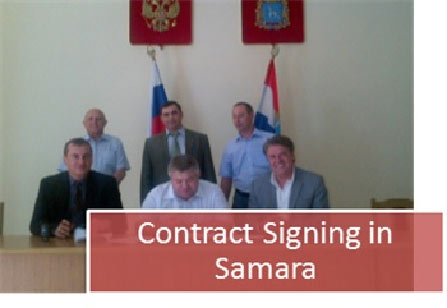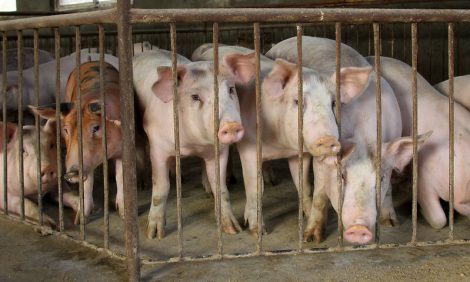



Pork Commentary: Road Trip Continues - Russia
RUSSIA - This past week, we were in Russia. In that time, we travelled from Krasnodar to Rostov-on-Don, Voronezh, Belgorod, Tambov, Penza and Samara. Some of it we flew some we drove. We drove about 1,600km (1,000 miles) through the heartland of Russian agriculture, writes Jim Long.As we have written in our past travels, Russia is big. Lots of land, big fields, large controlled land holdings. In our meetings we met companies that ranged in having cropland from 20,000 to 700,000 acres (8,000 to 283,000 hectares).
In the Kuban region near Krasnodar the Wheat harvest was long done, sugar beet harvest had begun, Corn and Sunflower hadn’t started. Wheat harvest was good, prices are about $200 USD/tonne ($5.00/bushel). Corn looked ok, but needed rain. One of the challenges is Russia, despite a huge block of black earth, does not have abundant moisture, 20-25 inches a year. As we headed north, Wheat harvest was underway. Farmland sells for $500 to $2,000 a hectare ($250 to $1000 an acre), depending on the area. Russia is improving its yield but could improve more, there is still an estimated 30-40 million acres that could be planted but isn’t.

The Russian Swine industry currently has Hog Prices between 80-90 rubles per kilogram. 90 rubles is almost $3 USD/kg or $1.40 USD/lb. liveweight. We met Russian producers who told us they were making over $100/head. It is Christmas everyday. Santa Claus keeps coming and coming.
Russia producers greatest challenge is the threat of African Swine Fever. If you get it, all your pigs are destroyed, buried or burned (like foot and mouth). It can be devastating and there is limited compensation.
We met a group in the South Kuban region that had their barns emptied and all hogs destroyed a few months ago. They were still waiting for compensation. The barns are empty, the owners not sure if they want to start up without further investors. They wanted to know if we would invest... we passed on that one.

The African Swine Fever (ASF) has put much of Russian farms on high alert. In the Belgorod region, where 20 per cent (300,000 sows approx.) of all Russia’s production is, in the last few weeks by government edict all backyard pigs and been bought and killed to protect the modern farms (about 65,000). The major companies in Belgorod bought the pigs. At the corporate farms there are 24 hour a day security guards, double fence, no one is allowed to bring food into the complex (companies supply), etc. Imagine the risk of tens of thousands of sows and all the market hogs all being exterminated. The financial losses would be in the hundreds of millions. Russian producers have truly a huge risk, but significant reward.
We expect over the next few months if the spread continues of ASF more areas like Belgorod will eliminate backyard pigs, which are considered the major incubator of the ASF spread. It is estimated 15 -30 per cent of Russia’s pigs are in backyard or old antiquated facilities. If these pigs are eliminated, Nelly, bar the door on high Russia’s prices could go.
Russia currently is importing 40-50 per cent of its pork. Russia’s per capita consumption of pork is almost 22 kilograms (45-40 lbs) similar to North America but half of what Europe eats per capita. Russia has about 150 million people. We were in Retail stores, pork is double the price of chicken. Russia’s GDP per capita is just under $10,000 per person or about 20 per cent of the USA. Russians like pork, they prove that everyday when they vote with their money. Russians are meat (pork) lovers. If per-capita income increases pork consumption will probably increase to European levels. If pork becomes cheaper that will increase pork consumption.

The challenge for Russian producers is to get the capital, permits, ASF and know how to raise pigs. The government’s have different subsidy and support levels to stimulate production. Only Russians need apply.
The ability to build bio-secure sites for production is very easy. It’s hard to explain the vastness of the land, but imagine driving from Ohio to Nebraska and seeing almost no livestock production.
The world we are told has to double its food production by 2050. This will be done by technology and infrastructure investment. Russia will feed itself and could become a major supplier of Pork to China and Asia. It has the land, it has the crops, it has the location. Not going to happen fast but if the political-social-economic situation in Russia lines up to facilitate it is a direction.
Short term, Russia will continue to import pork (probably five years). The Paylean issues is a trade barrier. Global suppliers are adjusting to the new rules.

One final note my 16 year old son Spencer has travelled with me throughout this trip. We both have been treated with tremendous hospitality by our hosts. Spencer has flown on glider planes, boat on the Mighty Volga River, barbeques, fished and stayed in wildlife preservation areas. We also did business, signed some contracts visited customers with the Genesus Russia team.
One of the highlights was my son Spencer’s flying in a glider. We landed at Voronezh Airport. They asked him if we wanted to fly in a Glider. He said yes! 30 minutes later he was being towed into the sky. They did backflips, corkscrews, zero gravity and dive bombs. He handled it. The Russian instructor called Spencer a warrior, most get sick, he didn’t. They offered him to stay to become a pilot, would take two weeks, but Business is Business, but I was one proud father.
Our Russian journey continues.








